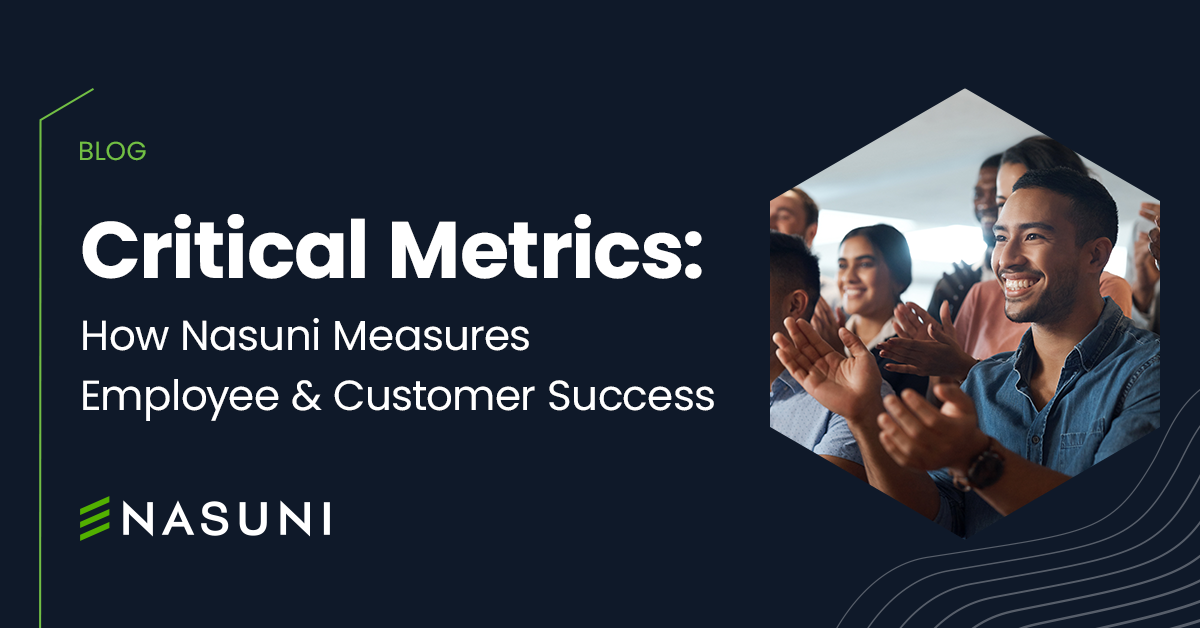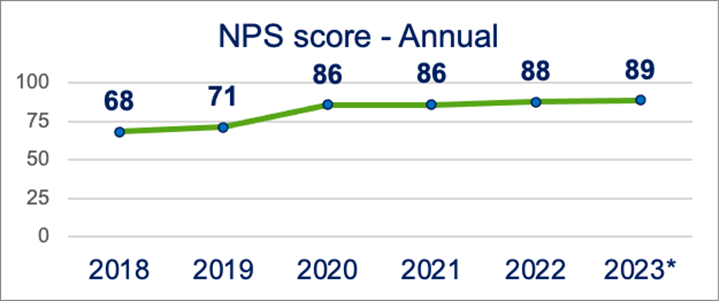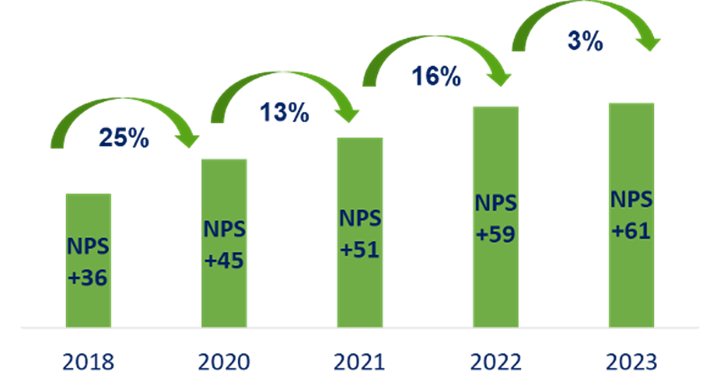Critical Metrics: How Nasuni Measures Employee & Customer Success
Nasuni CEO Paul Flanagan discusses how the company measures Nasuni customer success and employee satisfaction.
July 31, 2023

When I became the CEO of Nasuni a little over 6 years ago, we were an early-stage company with a great vision that was not quite yet a fine-tuned machine. At that time, I told our 60-something employees that we were going to invest in two things, in this order: our people and our customers. And if we did a great job investing in our employees and our customers, and made them each successful and happy, everything else would take care of itself. But how would we track our progress and truly measure our success? And would everything else really take care of itself?
Earlier this year, on March 16th, we announced that Nasuni had been Certified™ by Great Place to Work®. The prestigious award is based on reports from current employees surveyed about their experience working at Nasuni. Impressively, 95% of Nasuni employees said the company is a great place to work, compared to the Great Place to Work 2021 Benchmark study average of 57%. When we combine these survey results with our top decile employee retention rates, which we track quarterly, we feel that while we can always do better, we are accomplishing our goal of focusing on employees first.
But what I really want to discuss here are the results of our focus on investing in our customers and our passion to make them successful. There are several metrics that we track daily (incoming support cases and escalations, for example), weekly (case backlog), and quarterly (customer retention rates and expansion rates). However, two of the most important metrics we track are our “Transactional” Net Promoter Score (NPS) and our “Relational” Net Promoter Score (NPS).
You will often hear a company disclose their “Net Promoter Score,” but they rarely disclose whether it is a transactional or relational NPS. However, it makes a big difference. Both scores are very important, and any company that truly cares about customer satisfaction should track both closely as part of their overall customer success program. There are plenty of places online where you can get a full, detailed explanation of NPS, but let me give you a short explanation of each:
- Transactional NPS: this is an ongoing measurement process; a customer is surveyed after a transactional event such as a customer support case being resolved. The customer response is their opinion based on the specific event.
- Relational NPS: this is a customer survey taken at a regular interval (we do ours annually) that solicits a customer’s overall satisfaction with the company or brand; the feedback is holistic and is a measurement of customer loyalty.
At Nasuni, our Customer Success program includes measuring each of these scores, and we are very proud of the results as we have continued to focus on investing in making our customers successful through our products and services. For example, our Transactional NPS scores have increased each year since we started measuring this, as seen below:

These results were celebrated in a release early this year in May when we announced that Nasuni won the NorthFace ScoreBoard Service Award for the third consecutive year, delivering a Net Promoter Score of 88 in 2022, and a 99% customer satisfaction score. When companies talk about their “NPS” scores, they usually talk about their “Transactional NPS” because it is typically an easier grade based on a single event.
What most companies don’t disclose is their “Relational NPS” score because it is typically lower, and it represents a more challenging grading scale. However, this past week, we concluded our annual Relational Net Promoter Score survey, and we are extremely pleased with our results, which we are happy to share with you:

Note: we did not execute the program in 2019.
There are two things that stand out in these results. Firstly, they demonstrate our commitment to continuous improvement, year after year. Secondly, our Relational NPS score of 61 is 50% above the average score for B2B SaaS companies, which is a 41 (scores over 50 are considered “very good”)! We preach that “Everyone Owns Quality” at Nasuni, and you will find signs reflecting this message displayed on the walls of our offices. However, we recognize that there is always room for improvement, and we constantly strive to enhance our services for our customers. These results are a testament to our dedication to ongoing progress.
Investing in your employees and your customers is a pretty simple concept that many companies tend to forget. The Great Place to Work recognition, the NorthFace ScoreBoard Service Award, and our positive Transactional and Relational NPS scores all serve as evidence that our focus and efforts in these areas has been successful. But has everything else taken care of itself?
Let’s look at the business. During this same period, we have grown our revenues over 10X to well over $100M in annual recurring revenue. We have increased our customer retention rates to 98.7%. Our customer expansion rates have exceeded 120%. We’ve grown our employee base from 60 to over 500. We now have over 750 enterprise customers. And it all starts with investing in our employees by putting them in a position to succeed and investing in and making our customers successful and ensuring we never let them down.
I am extremely proud of our NPS scores, both Transactional and Relational. I strongly believe that companies should share both of these results with their customers and communicate their commitment to continuously improving them. After all, the most important, most valuable assets that we have at Nasuni are our phenomenal employees and our strong partnership with our customers. Thank you to both!